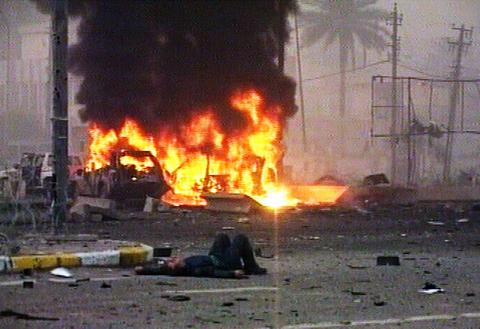A suicide bomber detonated 450kg of explosives in a pickup truck outside the headquarters of the US-led coalition yesterday, killing about 20 people and injuring more than 60 -- most of them Iraqis.
The 8am attack on a major street in the heart of the Iraqi capital was the deadliest in Iraq since former president Saddam Hussein was captured Dec. 13 near his hometown of Tikrit.

PHOTO: REUTERS
The blast occurred a day before the top US civil administrator in Iraq, Paul Bremer is to meet with UN Secretary-General Kofi Annan to ask for the world body's help in rebuilding Iraq.
A US military spokesman, speaking on customary condition of anonymity, said about 20 people were killed and 63 were wounded. The military initially said two of the dead were Americans working for the Pentagon but later retracted the statement, saying their nationalities were unknown but they were not Defense Department employees.
The wounded included three US civilians and three American soldiers, the military said. The rest of the victims were believed to be Iraqis.
The bomb exploded near the "Assassin's Gate" to Saddam's former Republican Palace complex, now the US-led occupation authority's headquarters. The gate is used by hundreds of Iraqis employed by the Coalition Provisional Authority, as well as US military vehicles.
The Iraqi Governing Council blamed the "heinous crime" on terrorists allied with Saddam.
"This is yet another stigma on the foreheads of the mass grave regime and its terrorist allies inside and outside [the country], who have no value for sacred things or human lives," the council said in a statement read by spokesman Hameed al-Kafai.
One witness, Salah Farhan, said he was going through the checkpoint when he saw a Land Cruiser try to cut to the head of the line. The vehicle exploded about two cars back from the gate, he said.

DAREDEVIL: Honnold said it had always been a dream of his to climb Taipei 101, while a Netflix producer said the skyscraper was ‘a real icon of this country’ US climber Alex Honnold yesterday took on Taiwan’s tallest building, becoming the first person to scale Taipei 101 without a rope, harness or safety net. Hundreds of spectators gathered at the base of the 101-story skyscraper to watch Honnold, 40, embark on his daredevil feat, which was also broadcast live on Netflix. Dressed in a red T-shirt and yellow custom-made climbing shoes, Honnold swiftly moved up the southeast face of the glass and steel building. At one point, he stepped onto a platform midway up to wave down at fans and onlookers who were taking photos. People watching from inside

MAKING WAVES: China’s maritime militia could become a nontraditional threat in war, clogging up shipping lanes to prevent US or Japanese intervention, a report said About 1,900 Chinese ships flying flags of convenience and fishing vessels that participated in China’s military exercises around Taiwan last month and in January last year have been listed for monitoring, Coast Guard Administration (CGA) Deputy Director-General Hsieh Ching-chin (謝慶欽) said yesterday. Following amendments to the Commercial Port Act (商港法) and the Law of Ships (船舶法) last month, the CGA can designate possible berthing areas or deny ports of call for vessels suspected of loitering around areas where undersea cables can be accessed, Oceans Affairs Council Minister Kuan Bi-ling (管碧玲) said. The list of suspected ships, originally 300, had risen to about

A Vietnamese migrant worker yesterday won NT$12 million (US$379,627) on a Lunar New Year scratch card in Kaohsiung as part of Taiwan Lottery Co’s (台灣彩券) “NT$12 Million Grand Fortune” (1200萬大吉利) game. The man was the first top-prize winner of the new game launched on Jan. 6 to mark the Lunar New Year. Three Vietnamese migrant workers visited a Taiwan Lottery shop on Xinyue Street in Kaohsiung’s Gangshan District (崗山), a store representative said. The player bought multiple tickets and, after winning nothing, held the final lottery ticket in one hand and rubbed the store’s statue of the Maitreya Buddha’s belly with the other,

Japan’s strategic alliance with the US would collapse if Tokyo were to turn away from a conflict in Taiwan, Japanese Prime Minister Sanae Takaichi said yesterday, but distanced herself from previous comments that suggested a possible military response in such an event. Takaichi expressed her latest views on a nationally broadcast TV program late on Monday, where an opposition party leader criticized her for igniting tensions with China with the earlier remarks. Ties between Japan and China have sunk to the worst level in years after Takaichi said in November that a hypothetical Chinese attack on Taiwan could bring about a Japanese